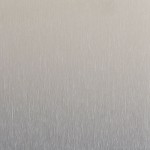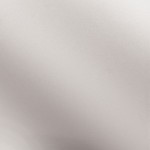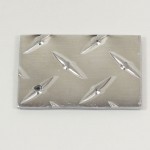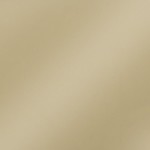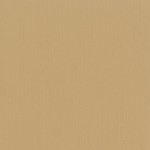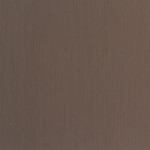A Consumers Guide to Door Kick Plates Material was created to try and answer as many questions as possible concerning Kick Plates. We sell a lot of kick plates, and are often asked many questions regarding finishes, thickness, sizing and mounting.
Kick Plates come in many finishes. In your silver tones we have Aluminum, Satin Nickel, Aluminum Diamond Plate, Polished Stainless Steel and Brushed Stainless Steel. In the gold tones we have, Polished Brass, Lifetime Polished Brass, Brushed Brass, Brushed Bronze, and Gold Aluminum. In the brown tones we have Duranodic Aluminum, Antique Brass and Oil Rubbed Bronze. We also offer Clear Plastic Door Kick Plates. And lastly, we have a Black Anodized Aluminum Kick Plate.
In the silver tones, Stainless Steel is the most popular. Stainless Steel Kick Plates come in four different versions, three in brushed or satin and one in polished. The three in brushed are all the same except for the thickness, or in kick plate terminology, gauge. We offer the Brushed Stainless Steel Door Kick PLates in 18 gauge, which is .037″ thick, 16 gauge, which is .050″ thick, and 14 gauge, which is .062″ thick. The Polished Stainless Steel Door Kick Plate is 16 gauge, or .050″ thick. Stainless steel offers one of the best material for commercial applications. They are very hard, and do not dent easily. The also offer the best corrosion resistances out there.
The Satin Nickel is a popular finish we have been seeing the last 15 years. The Satin Nickel Door Kick Plates are a solid brass plate that is Nickel Plated and then brushed to give it the Satin or Brushed look. These plates are 16 gauge or .050″ thick.
Anodized Aluminum Door Kick Plates are the most cost effective, least expensive. The aluminum plates are 16 gauge, or .050″ thick and have a brushed or satin finish. They have an anodized finish to resist corrosion and we find these in many commercial buildings through out the United States.
Aluminum Diamond Door Kick Plates are solid aluminum. They are 1/8″ thick and have a gloss or polished finish. These plates have the Diamond pattern, and the diamonds are 1-1/8″ long.
We often have people looking for Brushed Chrome or Polished Chrome, but the appearance of the two finishes next to each other is very difficult to tell which is which. Also a brushed chrome or polished chrome kick plate would be a brass plate which is then chrome plated and brushed or polished depending on the plate. Brass is a soft metal that dents easily, and also does not offer the corrosion resistance that stainless steel does. Since stainless steel is stable in any environment, they do not have to clear coat the plate.
In the gold tones we have Polished Brass, Lifetime Polished Brass, Gold Aluminum, Brushed Brass, and Brushed Brass. Polished Brass and Lifetime Polished Brass are the most common in the gold tones. The standard Polished Brass is a solid brass kick plate that is polished and then clear coated to prevent oxidation. These plates are 16 gauge or .050″ thick. A draw back of the Polished Brass Plates is oxidation. If the plate becomes scratched or dented, there is a good probability that the clear coat delaminates and moist could get under the surface. When this happens, the plate will tarnish. The brass base material is softer, so the chances of them becoming scratched or dented in commercial applications is pretty high.
The Lifetime Polished Brass Door Kick Plate has a 16 gauge (.050″ thick) base metal, that is then plated with a artificial brass finish that is then polished. The process is called Poly Vapor Deposition or PVD, which is why we hear the name Lifetime Polished Brass Kick Plate PVD. Because the finish is an artificial brass, it does not have to be clear coated, so it will never tarnish. The Lifetime Polished Brass finish cost the same as the Solid Brass Polished Kick Plates.
The Brushed Brass Door Kick Plates are the same as the Polished Brass Door Kick Plates, solid brass, 16 gauge (.050″ thick), but the surface is Satin or Brushed. The plates is then Clear Coated to prevent oxidation or tarnishing.
The Brushed Bronze Door Kick Plates are solid bronze plates that are finished in a Satin or Brushed finish and then clear coated. The Bronze Kick Plates are similar to the Brass Kick Plates, but they have more of an orange hue, were as the brass plates have a yellow hue.
The Gold Aluminum Door Kick Plates have an aluminum base metal and a polished brass looking finish. These plates are only 18 guage (.040″ thick). The surface of these plates are a brushed or satin finish. They are really inexpensive, and are what you find at big discount building centers. If you find a really inexpensive polished brass kick plate online, it is probably Gold Aluminum.
In the brown tones we have Oil Rubbed Bronze, Dark Bronze Duranodic and Antique Brass. Our Dark Bronze Oil Rubbed Bronze Door Kick Plates (US10B) are a baked on powder coat on brass base metal. We switched to this finish 5 years ago due to color variations in the US10B Oil Rubbed Bronze finishes. The US version was much lighter than the Asian version, which is where most the door hardware is made these days. The cost of Oil Rubbing was going through the roof and many platers were having issue with the environmental impact and EPA regulations in the United States. Our Oil Rubbed Kick Plates are 16 gauge (.050″) thick.
The Duranodic Aluminum Door Kick Plates are dark bronze or brown and match the Dark Brown color we find on Storefront doors. These plates have an aluminum base metal, which is 18 gauge (.040″) thick that is then Anodized in the Dark Brown Color. The Anodized Black Aluminum Door Kick Plates are the same as above, but are anodize Black. Both of these plates have a brushed or satin finish. These plates relatively inexpensive.
The last brown tone plate is Antique Brass. These plates are a solid brass plate, that is then brushed to create a satin finish. The plate is then clear coated, but the clear coat has a stain in it, which creates the brownish color. This plate is also 16 gauge (.050″) thick.
The last kick plate material we have is the Clear Plastic Door Kick Plates. These plates are .125″ thick, and are made of clear acrylic. Screw mounting is the only option on this plate, because the tape and glue would show through.
Kick Plates can be mounted by screws, two way tape, and they can be glued to the door. Our plates come standard with screw mounting. The manufacture sends #6 x 5/8″ Oval Phillips Undercut Stainless Steel screws, unless you are ordering a Brass, Bronze or Antique Plate, in that case they ship a matching #6 screw. The number of holes on the screw mounted plates is determined by an industry wide standardize template. A height between 6-10″ will have 10 holes for plates up to 33″ and 12 holes for plates between 33 and 40″.
You can order these plates with tape mounting, but on larger plates and especially plates with a stainless steel base metal, it is not recommended. Stainless Steel plates are too heavy and they most likely will not stick. We can also ship them with no holes, if you want to drill your own holes. This is fine on the Brass and Aluminum base metals, but again Stainless Steel is very hard and a drill press would be recommended. You can glue them on, I would recommend liquid nails, and some C Clamps with the door on saw horses.
The Sizing of Kick Plates is personal preference. Some people leave a half inch on the sides and bottom, some people cover the complete bottom of the door. The people who cover the complete bottom of the door are usually trying to hide lamination, rust or rotting issues with there doors. Either way it is personal preference. One thing I would add is to check your door and make sure the new plate does not interfere with the jamb stop. The jamb stop is the molding on the door frame the stops the door from swinging through the opening.
We do not stock any of these kick plates, we custom order all of them. We can make any size plate you would like down to a 1/16″ tolerance. The plates on our web sites are more of the standard sizes, if you need a custom size just post the dimension you would like, and we will send you quote. The lead time on custom plates will only be a day or two longer.
Upon receiving your new kick plates, if you order them from us, you will find the plate in a box with a piece of wood for support in shipping. The plates are wrapped in a craft paper, and you will find the mounting screws in the triangular ends of the craft paper, if you opted for the screw mounting. The Plates will also have a White or Clear plastic film over the plates. This film is designed to protect the plate during shipment and manufacturing. To remove the film, scratch at the corners of the plate and remove. If the film is left on it will yellow and if in direct sunlight, adhere to the plate and will become almost impossible to remove. The film coating is one of the largest issues customers have upon receiving the new plates, many customers have said the finish is awful, but upon removing say how perfect they are!
]]>